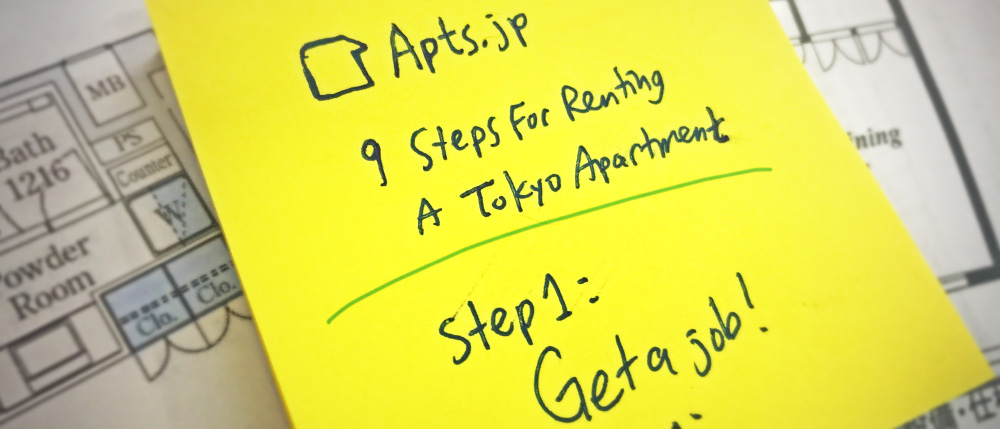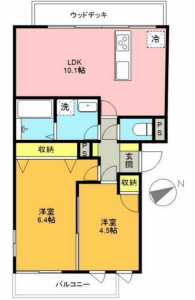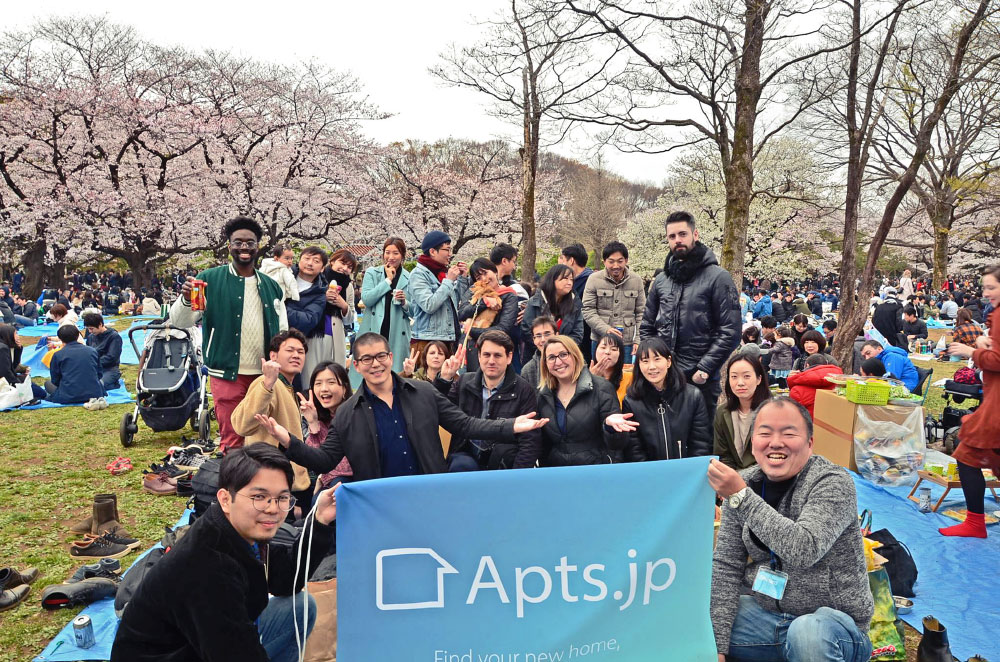
13 Mar 9 Steps For Renting A Tokyo Apartment
Last Modified on October 12th, 2020 at 04:07 pm
Category: Application Process, Renting in Japan, Where to Live
Planning to move to Tokyo and are clueless on how to start the renting process?
We will breakdown all the steps you need to make this transition as easy as possible!
Check out these 9 simple steps that will get you into your new apartment in Tokyo fast.
Step 1
Get A Full-Time Job

This might be the most obvious step, yet it’s the most important step to start the whole apartment rental process. Without a job, it’s basically impossible to rent an apartment in Tokyo. The reason is that one’s employment is used as part of the screening process, and it’s not like in many other places in the world, where one can just handover a handful of cash to rent an apartment. Tokyo has quite strict processes for apartment rentals.
A lot of people contact us at Apts.jp, dreaming about living in Tokyo, but such notions are just pipe dreams, without proper employment.
If you haven’t found a job in Tokyo yet, check out these sites that post open positions specifically for Expats:
★ Already have a job lined up? Okay, great! Now let’s continue to the next step!
Shortcut Step 1.5
FAST FORWARD TO STEP 6!
▶ CONTACT US RIGHT NOW, and we can get started right away! We will take care of step 2,3,4, & 5 for you.
We will provide you with all the information you need and answer any questions you have. The more you let us know about what you want, the more we can let you know about what’s possible.
Step 2
Find the Location That Works For You
Tokyo has many exceptional locations to choose from, each with its unique charm. Despite many expats wanting to live in popular locations, so many Tokyo locations have depth and charm to them!
The key to finding your perfect home base depends on a few factors. Consider these points:
• Employer Location
• Which Train Line to Live On
• Nightlife & Entertainment
• Schools for your kids
As for train lines, some are cheaper than others, subways tend to be more expensive than trains- there are some points to consider. Most employers reimburse travel expenses, but if you have a partner or family, they will likely need to be covering their own fares. Some lines are also notorious for sardine-packed morning commuters, like the Tozai line and Chuo-Sobu lines. These trains are at 199% overcrowded (on the crowdedness rate) during morning rush hour — something you might not want to deal with.

Also, living at a station with an Express stop tends to have a higher rent cost than a station that only stops with Local trains. If you don’t mind a longer ride, the price tag can be worth it. Your ideal commute time in Tokyo might be about 30~45 minutes, but this would be considered short. A survey has shown that Japanese locals will travel upwards to 1 hour one way to get to work in greater Tokyo (NHK survey, 2015). A total of 116 minutes commute a day. Since trains are impeccable- the cleanest train you’ve probably ever stepped foot in- Tokyo work commutes aren’t considered bad– long commutes are the norm for the general Tokyo populace.
★ SPECIAL NOTE: If you have a limited or strict budget, you may not always be able to live in your most favorite locations. Although it’s important to consider where you want to live in Tokyo, realistically, you WILL be limited by your rent budget, SALARY, and employer location.
We at Apts.jp are very knowledgeable on Tokyo locations, including great alternate locations for all well-known spots. We may not always be able to get you into your idealized dream apartment, but we can get you into the best of what you can afford– and a fulfilled reality is always better than an unrealized dream. Don’t let unrealistic expectations stop you from living someplace great! Get realistic! CONTACT US and let us show you the best of what’s possible for your situation.
Step 3
Set Up A Budget

Your rent budget will be the critical factor in determining the location and what you can afford, as noted above.
★ As a Property Manager screening rule– One’s total monthly rent (rent + management fee) cannot exceed 1/3 of one’s gross monthly salary. This rule is quite strict! *The only cases where there starts to be any possibility of lenience on this rule, is for rent budgets around ¥250,000 and upwards.
As such, your hypothetical max rent possible in Tokyo will be:
Monthly gross salary, divided by 3.
It is best to set a budget that you feel comfortable with, but it’s also wise to consider what’s ACTUALLY possible in Tokyo for an expat. (sidenote: We get quite a few inquiries, searching for high-life apartments at bargin-bin prices, which is a ludicrous notion in Tokyo; a city having some of the most expensive rent prices in the world…) What you can get in an apartment in Tokyo might be VERY different compared to what you can find back home.
Set your rent budget first, and then see what is available within that budget.
DO NOT try the opposite of arbitrarily choosing what you want- based on imagination- then choosing a budget that you’re comfortable with. Doing this often ends up in disappointment, as one realizes that some things are just not affordable in Japan. Tokyo is a high-demand city, and it’s almost impossible to find budget apartments. Come to Tokyo with a realistic expectation of what you can get, and you won’t keep trying to pointlessly “buy a Lamborghini for Toyota prices”.
Your moving costs will most likely be high (much higher than most any other country), which includes costs such as Deposit, Key money, First full month’s rent, Prorated rent for current month, Lock change fee, Compulsory fire/rental insurance, Pet deposit if with a pet, Agency Fee- there can be quite a bit more. (The irony is that the lower the rent prices, the higher the probability of miscellaneous fees, as property managers tack these on to make more money off of lower rent units.)
★ Tokyo rental average move-in costs are currently (in 2020), 4.5 to 6+ months’ worth of rent upfront.
Some property management companies might not require all of the aforementioned fees, and sometimes, amazing deals do come up! But if your priority is to find a place with the lowest initial move-in costs as possible, then you NEED TO BE incredibly flexible with location and style, as the choices WILL BE scarcely limited. The upfront fees are something that has been a part of Tokyo housing culture for decades and just comes with the cost of living in one of the best cities in the world.
Land/space is very limited in Tokyo, and rentals get taken quickly. As such, property managers and owners have absolutely no reason to negotiate prices, because there is someone right behind you, who will happily accept the apartment costs.
CONTACT US if you need consultation on Tokyo apartment or house rental costs.
Check out our article on why Expat housing can be more expensive.
Step 4
Know What You Want In An Apartment
Details details details! Size, location, criteria– What are your priorities? These are the questions you will get asked by us at Apts.jp, when we start your apartment search.
We recommend searching on Apts.jp to get a realistic view of what’s possible for Expats, but if you check out Japanese apartment portal sites to get an idea of rent prices– Learn the lingo. ★ SPECIAL NOTE: A VERY high number of listings on Japanese apartment portal sites aren’t possible for non-Japanese, so browsing them does not give a realistic portrayal of the rental market for expats.– We’ll continue this point at the end of this section. If you’re going to check Japanese apartment portal sites anyway- Read on for the lingo!
How to read a floor plan is different than how you would read it in western countries. Layouts use the initials, L~D~K~S (“Living, Dining, Kitchen, Storage”).
A 1LDK would be a Living room, a Dining space, and a Kitchen space, with the number in front (1) standing for how many stand-alone rooms you would have. Here are some titles you might see:
~ Studio type layouts ~
1Room (ワンルーム)- Everything in one space (kitchen, sleeping area, etc)
1K- A room with the Kitchen separated by a door (the kitchen is in a hallway).
1DK- A room with a Dining/Kitchen space, separating main space by a door (can fit a tiny dining table in the Dining space)
~ 1 Bedroom type layouts ~
1LDK- Living/Dining/Kitchen space, with a separate bedroom. Should be enough room to have a couch, dining table, and kitchen to cook. This is the standard western “1 Bedroom Apartment”.
2DK- 2 enclosed bedrooms with a separate dining/kitchen space. (This is an excellent alternative to 1LDK, as a bedroom can be converted into a living area.)
1LDKS- 1 Bedroom layout with a separate Storage room.
When looking at a Japanese floor plan, how do you read the size of the room? Firstly it’s in square meters, and then each room will be labeled in tatami size (jo). A 6-jo means 6 tatami mats fitting into that room. A tatami mat measures 1.76m x 0.88m. So 6-jo would be 6x 1.7mx.88m.

Japanese 2LDK floorplan example (note the 10.1jo, 6.4jo, and 4.5jo room sizes)
Next, you must put a list of priorities together.
How long of a walk from the train station is ok for you? (If you have a limited budget, being picky on this point will limit your options drastically)
Can your toilet be inside your shower room, a new bath, no tatami flooring, etc.. Give us what you think are your must-haves and deal-breakers, and we can let you know what’s possible.
Step 5
Search on Apts.jp to see what’s possible
(updated multiple times daily)
▶ Apts.jp Tokyo Apartment Search
As soon as you know you want to move to/within Tokyo- or as soon as your Tokyo arrival date is set- start looking at listings on our website. It will help give you an idea of what is out there and understand budget vs. realistic expectations.
★ SPECIAL NOTE! If you check on Japanese apartment portal sites, PLEASE NOTE that many of the apartments are expired, and of the ones that are available, only about 20% of them are available to Japanese-speaking Expats. If one doesn’t speak Japanese, only a small percent of those 20% will be possible.
Apts.jp only lists rentals that are 100% confirmed available to Expats. When spoken Japanese is required for a unit, it will be noted on the listing.
Step 6
Contact Us to Start The Process

Saw a place that you like on our site? Ready to explore your options?
We will help you with all the steps needed in finding your apartment. No worries about language barriers, or what documents are needed, or finding a guarantor– we will sort out everything for you. We want to take the load of “apartment searching in a foreign land” off of you and make moving enjoyable and stress-free. With our highly trained team and solid reputation, we’ll be there for you every step of the way.
There is a misconception about apartments being difficult to rent for non-Japanese, but it is out job to take on such difficulty! If you go with us, process will be as smooth as possible.
(CHECK OUT our blog post, regarding more common misconceptions about renting.)
Contact us with: your desired size, location options, priorities- fill out as much of the details as possible- and we start preparing for your apartment search! (If done at step 1.5, we will have already helped you find your location, budget, and priorities- no need to stress over it!)
Step 7
Start Preparing Necessary Documents to Apply

We advise our clients to prepare all the documents needed before viewing a potential future home, whether apartment or house. Long-term rentals in Tokyo can get taken on the day they are released (to getting taken site unseen months in advance- no joke). As such, if you view an apartment you like but aren’t prepared to apply, the time it takes to get documents sorted could result in the apartment getting taken by someone else.
Please prepare and have these documents ready:
1) Residence Card (with your temporary address stamped on it ★ Please note that hotels CANNOT be used as temp residences– please contact us, if you have questions or concerns about your temp housing)
2) Proof of Employment (signed employment agreement if just arriving or tax payment records if working in Japan over one year)
3) Mobile Phone Number
4) Emergency Contact in Japan
— Name (kanji & katakana if Japanese)
— Date of Birth (required to confirm not elderly)
— Home Address (required to confirm Japan residence)
— Personal Phone Number (required in case of emergency, as workplaces often close on weekends)
— Relation to You
— Nationality (Japanese-national is IDEAL- and most apartments require a Japanese-national for emergency contact– but if your emergency contact is not a Japanese-national, they 100% have to speak Japanese at a high-level)
A bank account isn’t necessary to apply for an apartment, but it is required to pay rent and initial move-in costs. You will need a mobile number to set up a bank account. We advise you to get your phone as soon as you get your Residence Card with your temporary housing address stamped on it at the respective ward office of your temporary location.
Japanese-national emergency contact is the most difficult requirement for most expats, but on the plus side, many HR staff or new Japanese colleagues, are willing to be one’s emergency contact, as there is no liability (only required to be a point of contact, in case of emergency).
Step 8
View Apartments and Apply to Your Choice
After you get in contact with us, we will search the rental market very thoroughly using national databases. We at Apts.jp have access to most rentals possible in all of Japan- we only can’t touch exclusive deals. So if what you want exists- and it’s possible for Expats- we’ll find it.
So now you’re at the most exciting part (besides arriving in Tokyo)– START VIEWING APARTMENTS!!! 🙂 (Yesss)
★ About one month before your desired move-in date, we will begin searching the market thoroughly for you and start sending potential apartments for you to consider. Let us know the ones you like, and we will set up viewing appointments. Anything sooner, and it will be gone by your move-in date– Also, it’s not possible to set one’s move-in date later than 1 month after date of application, so what’s available for you will not only depend on your budget- but also the desired date of your move-in. (With apartments in Tokyo, everything has to be timed just right!)
After viewing an apartment you want- BOOM- we will apply as fast as possible for you!!! If you did all your preparations possible, this will give the highest likelihood of getting your application 1st in line.
Places are awarded on a first-come, first-served basis. If you like an apartment, don’t waste any time. We do all the paperwork for you and will apply on your behalf. So don’t worry if you can’t speak or read Japanese- or just learning- we’ve got you covered!
Step 9
Contracting & Move-In Time!

You found the apartment you want to live in, your application is approved, and then it’s paying move-in costs, contracting, and then– MOVE-IN TIME! 🙂
We setup all your base utilities and assist with anything internet or furniture related, if necessary. We also inspect your apartment thoroughly to report existing damages to the property managers. So from day 1 in your apartment, you’ll be good to go! Our Support is also LEASE LENGTH, so when it’s time for you to move-out- if you need our help ANYTIME- we’ll be right here waiting for you. ?
With these 9 steps, and our help, an Expat-friendly real estate agency, you should have no problem finding a place in Tokyo. Very close to 100% of our clients are Expats!!! Expat rentals are our SPECIALTY.)
▶ Contact Us, and let us give you head-start on your new life in one of the best cities in the world! We look forward to supporting you move. 🙂
Article you may be interested in: Why Tokyo Expat Rentals Can be Expensive
